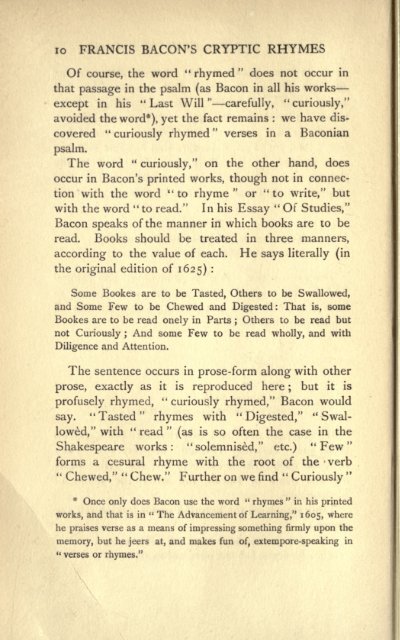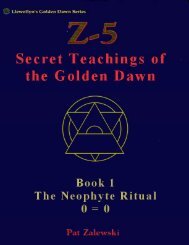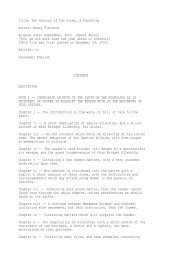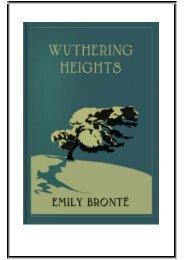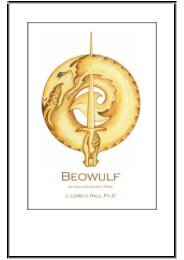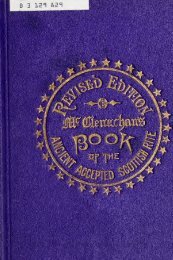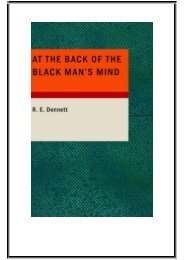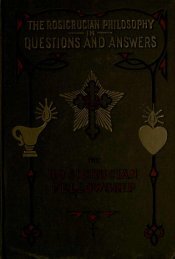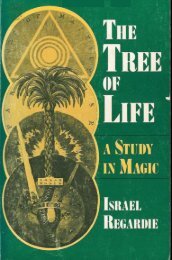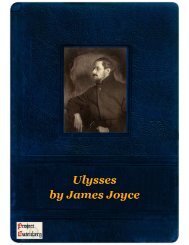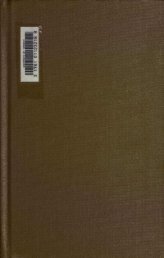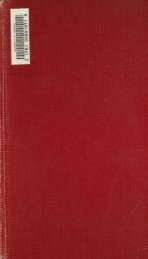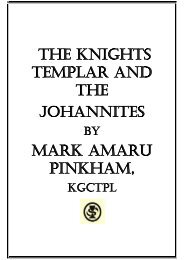- Page 2: UNIVERSITY OF TORONTO LIBRARY ONTAR
- Page 7 and 8: - FRANCIS BACO CRYPTIC RHY AND THE
- Page 9: would like to express my heartfelt
- Page 13 and 14: FRANCIS BACON CONFESSES, IN THE PRE
- Page 15 and 16: FRANCIS BACON'S CRYPTIC RHYMES 3 fr
- Page 17 and 18: FRANCIS BACON'S CRYPTIC RHYMES 5 Me
- Page 19 and 20: FRANCIS BACON'S CRYPTIC RHYMES 7 cl
- Page 21: FRANCIS BACON'S CRYPTIC RHYMES 9 oc
- Page 25 and 26: FRANCIS BACON'S CRYPTIC RHYMES 13 h
- Page 27 and 28: II WHAT WAS FRANCIS BACON'S ESTIMAT
- Page 29 and 30: FRANCIS BACON'S CRYPTIC RHYMES 17 P
- Page 31 and 32: FRANCIS BACON'S CRYPTIC RHYMES 19 n
- Page 33 and 34: FRANCIS BACON'S CRYPTIC RHYMES 21 p
- Page 35 and 36: FRANCIS BACON'S CRYPTIC RHYMES 23 t
- Page 37 and 38: . [%" ' FRANCIS BACON'S CRYPTIC RHY
- Page 39 and 40: FRANCIS BACON'S CRYPTIC RHYMES 27 c
- Page 41 and 42: FRANCIS BACON'S CRYPTIC RHYMES 29 t
- Page 43 and 44: FRANCIS BACON'S CRYPTIC RHYMES 31 B
- Page 45 and 46: FRANCIS BACON'S CRYPTIC RHYMES 33 p
- Page 47 and 48: FRANCIS BACON'S CRYPTIC RHYMES 35 A
- Page 49 and 50: FRANCIS BACON'S CRYPTIC RHYMES 37 T
- Page 51 and 52: FRANCIS BACON'S CRYPTIC RHYMES 39 a
- Page 53 and 54: FRANCIS BACON'S CRYPTIC RHYMES 41 "
- Page 55 and 56: FRANCIS BACON'S CRYPTIC RHYMES 43 A
- Page 57 and 58: FRANCIS BACON'S CRYPTIC RHYMES 45 t
- Page 59 and 60: FRANCIS BACON'S CRYPTIC RHYMES 47 t
- Page 61 and 62: FRANCIS BACON'S CRYPTIC RHYMES 49 p
- Page 63 and 64: ightful FRANCIS BACON'S CRYPTIC RHY
- Page 65 and 66: FRANCIS BACON'S CRYPTIC RHYMES 53 F
- Page 67 and 68: FRANCIS BACON'S CRYPTIC RHYMES 55 N
- Page 69 and 70: FRANCIS BACON'S CRYPTIC RHYMES 57 T
- Page 71 and 72: FRANCIS BACON'S CRYPTIC RHYMES 59 C
- Page 73 and 74:
FRANCIS BACON'S CRYPTIC RHYMES 61 e
- Page 75 and 76:
FRANCIS BACON'S CRYPTIC RHYMES 63 H
- Page 77 and 78:
FRANCIS BACON'S CRYPTIC RHYMES 65 1
- Page 79 and 80:
FRANCIS BACON'S CRYPTIC RHYMES 67 (
- Page 81 and 82:
FRANCIS BACON'S CRYPTIC RHYMES 69 m
- Page 83 and 84:
FRANCIS BACON'S CRYPTIC RHYMES 71 T
- Page 85 and 86:
FRANCIS BACON'S CRYPTIC RHYMES 73 r
- Page 87 and 88:
FRANCIS BACON'S CRYPTIC RHYMES 75 T
- Page 89 and 90:
FRANCIS BACON'S CRYPTIC RHYMES 77 E
- Page 91 and 92:
FRANCIS BACON'S CRYPTIC RHYMES 79 T
- Page 93 and 94:
FRANCIS BACON'S CRYPTIC RHYMES 81 A
- Page 95 and 96:
FRANCIS BACON'S CRYPTIC RHYMES 83 H
- Page 97 and 98:
VII THE RHYMES IN FRANCIS BACON'S P
- Page 99 and 100:
FRANCIS BACON'S CRYPTIC RHYMES 87 T
- Page 101 and 102:
FRANCIS BACON'S CRYPTIC RHYMES 89 p
- Page 103 and 104:
FRANCIS BACON'S CRYPTIC RHYMES 91 a
- Page 105 and 106:
FRANCIS BACON'S CRYPTIC RHYMES 93 H
- Page 107 and 108:
FRANCIS BACON'S CRYPTIC RHYMES 95 n
- Page 109 and 110:
FRANCIS BACON'S CRYPTIC RHYMES 97 B
- Page 111 and 112:
FRANCIS BACON'S CRYPTIC RHYMES 99 i
- Page 113 and 114:
FRANCIS BACON'S CRYPTIC RHYMES 101
- Page 115 and 116:
FRANCIS BACON'S CRYPTIC RHYMES 103
- Page 117 and 118:
FRANCIS BACON'S CRYPTIC RHYMES 105
- Page 119 and 120:
FRANCIS BACON'S CRYPTIC RHYMES 107
- Page 121 and 122:
FRANCIS BACON'S CRYPTIC RHYMES 109
- Page 123 and 124:
FRANCIS BACON'S CRYPTIC RHYMES in a
- Page 125 and 126:
FRANCIS BACON'S CRYPTIC RHYMES 113
- Page 127 and 128:
FRANCIS BACON'S CRYPTIC RHYMES 115
- Page 129 and 130:
FRANCIS BACON'S CRYPTIC RHYMES 117
- Page 131 and 132:
FRANCIS BACON'S CRYPTIC RHYMES 119
- Page 133 and 134:
FRANCIS BACON'S CRYPTIC RHYMES 121
- Page 135 and 136:
FRANCIS BACON'S CRYPTIC RHYMES 123
- Page 137 and 138:
FRANCIS BACON'S CRYPTIC RHYMES 125
- Page 139 and 140:
IX FRANCIS BACON'S ESSAY-RHYMES, AN
- Page 141 and 142:
FRANCIS BACON'S CRYPTIC RHYMES 129
- Page 143 and 144:
FRANCIS BACON'S CRYPTIC RHYMES 131
- Page 145 and 146:
FRANCIS BACON'S CRYPTIC RHYMES 133
- Page 147 and 148:
FRANCIS BACON'S CRYPTIC RHYMES 135
- Page 149 and 150:
FRANCIS BACON'S CRYPTIC RHYMES 137
- Page 151 and 152:
FRANCIS BACON'S CRYPTIC RHYMES 139
- Page 153 and 154:
FRANCIS BACON'S CRYPTIC RHYMES 141
- Page 155 and 156:
FRANCIS BACON'S CRYPTIC RHYMES 143
- Page 157 and 158:
FRANCIS BACON'S CRYPTIC RHYMES 145
- Page 159 and 160:
FRANCIS BACON'S CRYPTIC RHYMES 147
- Page 161 and 162:
FRANCIS BACON'S CRYPTIC RHYMES 149
- Page 163 and 164:
FRANCIS BACON'S CRYPTIC RHYMES 151
- Page 165 and 166:
FRANCIS BACON'S CRYPTIC RHYMES 153
- Page 167 and 168:
FRANCIS BACON'S CRYPTIC RHYMES 155
- Page 169 and 170:
FRANCIS BACON'S CRYPTIC RHYMES 157
- Page 171 and 172:
FRANCIS BACON'S CRYPTIC RHYMES 159
- Page 173 and 174:
FRANCIS BACON'S CRYPTIC RHYMES 161
- Page 175 and 176:
1 63 been hurling darts of sharpest
- Page 177 and 178:
FRANCIS BACON'S CRYPTIC RHYMES 165
- Page 179 and 180:
FRANCIS BACON'S CRYPTIC RHYMES 167
- Page 181 and 182:
FRANCIS BACON'S CRYPTIC RHYMES 169
- Page 183 and 184:
FRANCIS BACON'S CRYPTIC RHYMES 171
- Page 185 and 186:
FRANCIS BACON'S CRYPTIC RHYMES 173
- Page 187 and 188:
FRANCIS BACON'S CRYPTIC RHYMES 175
- Page 189 and 190:
FRANCIS BACON'S CRYPTIC RHYMES 177
- Page 191 and 192:
To take the saft'st occasion by the
- Page 193 and 194:
FRANCIS BACON'S CRYPTIC RHYMES 181
- Page 195 and 196:
FRANCIS BACON'S CRYPTIC RHYMES 183
- Page 197 and 198:
FRANCIS BACON'S CRYPTIC RHYMES 185
- Page 199 and 200:
FRANCIS BACON'S CRYPTIC RHYMES 187
- Page 201 and 202:
FRANCIS BACON'S CRYPTIC RHYMES 189
- Page 203 and 204:
FRANCIS BACON'S CRYPTIC RHYMES 191
- Page 205 and 206:
FRANCIS BACON'S CRYPTIC RHYMES 193
- Page 207 and 208:
FRANCIS BACON'S CRYPTIC RHYMES 195
- Page 209 and 210:
which rhyme : It is generally bette
- Page 211 and 212:
FRANCIS BACON'S CRYPTIC RHYMES 199
- Page 213 and 214:
FRANCIS BACON'S CRYPTIC RHYMES 201
- Page 215 and 216:
FRANCIS BACON'S CRYPTIC RHYMES 203
- Page 217 and 218:
FRANCIS BACON'S CRYPTIC RHYMES 205
- Page 219 and 220:
FRANCIS BACON'S CRYPTIC RHYMES 207
- Page 221 and 222:
FRANCIS BACON'S CRYPTIC RHYMES 209
- Page 223 and 224:
FRANCIS BACON'S CRYPTIC RHYMES 211
- Page 225 and 226:
FRANCIS BACON'S CRYPTIC RHYMES 213
- Page 227:
FRANCIS BACON'S CRYPTIC RHYMES 215
- Page 230 and 231:
2i 8 FRANCIS BACON'S CRYPTIC RHYMES
- Page 232 and 233:
220 FRANCIS BACON'S CRYPTIC RHYMES
- Page 234 and 235:
222 FRANCIS BACON'S CRYPTIC RHYMES
- Page 236 and 237:
224 FRANCIS BACON'S CRYPTIC RHYMES
- Page 238 and 239:
226 FRANCIS BACON'S CRYPTIC RHYMES
- Page 240 and 241:
228 FRANCIS BACON'S CRYPTIC RHYMES
- Page 242 and 243:
230 FRANCIS BACON'S CRYPTIC RHYMES
- Page 244 and 245:
232 FRANCIS BACON'S CRYPTIC RHYMES
- Page 246 and 247:
234 FRANCIS BACON'S CRYPTIC RHYMES
- Page 248 and 249:
APPENDIX TO CHAPTER V TEMPORIS PART
- Page 250 and 251:
238 FRANCIS BACON'S CRYPTIC RHYMES
- Page 252 and 253:
2 4o FRANCIS BACON'S CRYPTIC RHYMES
- Page 254 and 255:
242 FRANCIS BACON'S CRYPTIC RHYMES
- Page 256 and 257:
244 FRANCIS BACON'S CRYPTIC RHYMES
- Page 258 and 259:
246 FRANCIS BACON'S CRYPTIC RHYMES
- Page 260 and 261:
248 FRANCIS BACON'S CRYPTIC RHYMES
- Page 262 and 263:
EDWIN BORMANN'S WORKS ON BACON-SHAK
- Page 264 and 265:
JAN


